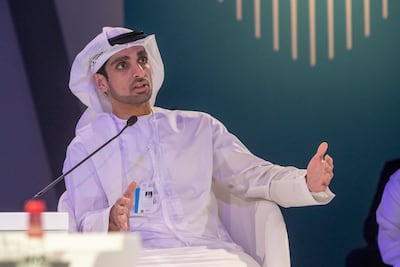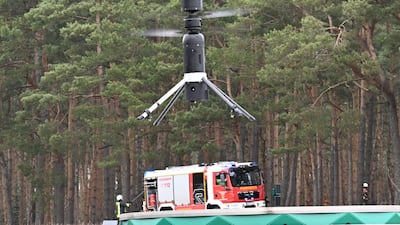Militants could get their hands on futuristic weapons if the world acts recklessly with new technology, instead of "putting controls in place", a UAE minister told an artificial intelligence summit on Thursday.
Omran Sharaf, assistant foreign minister for advanced science and technology, said the line between peaceful and military use of new tech was "becoming more vague". It is also more difficult to keep highly advanced systems safely in the hands of governments, he added.
"We have violent non-state actors owning ballistic technologies, which sometimes state actors don’t even own," he told the Global Conference on AI, Security and Ethics 2025 hosted by UN disarmament chiefs in Geneva. "So you can imagine new technologies or emerging technologies that are currently being used by companies, by governments, one day ending up in the wrong hands.
"We shouldn’t be paranoid, we should be very smart about the way we approach it. There’s a lot of opportunities and a lot of benefits that those emerging technologies bring to the table.
"But, at the same time, we should be very cautious not to be reckless about it, and work on systems that ensure responsible behaviour, bring transparency and make sure there are controls put in place so that it doesn’t fall into the wrong hands."

The rapid rise of AI has pushed governments to find a delicate balance between embracing its potential benefits, while guarding against unforeseen dangers from out-of-control technology. The administration of US President Donald Trump has criticised Europe for going too far with tech regulations.
Concerns have also been raised about AI's potential use in nuclear strikes or the development of chemical weapons. Israel has been accused of using AI software in strikes on Gaza that killed civilians and Hamas militants.
Mr Sharaf, who oversaw the UAE’s mission to Mars, urged delegates in Geneva to think of AI safety and defence issues as a joint concern. He warned that a divided world could struggle to set standards and ethics rules.
"In the past it was very easy for us to say this is civilian and this is military," he said. "In the past it was very easy for us to say only state actors would own these technologies, and we will control it.
"Today, with emerging technologies, this is becoming very difficult. The line between civilian and military is becoming more vague. It’s a grey area. So almost everything today that we approach is turning into a dual-use technology."
The UAE has led on AI with a series of forward-looking measures. The country appointed Omar Al Olama to be the world's first AI minister in 2017. In a ranking last year, the UAE placed fifth out of 36 countries for AI competitiveness, behind only the US, China, the UK and India.
Abu Dhabi announced plans in January to have a fully AI-powered government by 2027. The Dh13 billion ($3.5 billion) plans include automating official processes and making cloud computing the norm.


